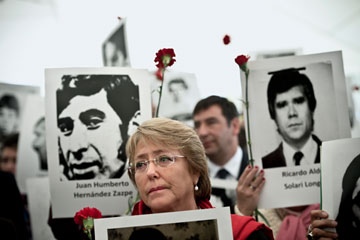
Bachelet at a ceremony marking the 40th anniversary of Chile's coup.
(2 of 2)
The moment that these two candidates began to square off in this election cycle, there was the temptation to ask a very old question again: Was Matthei's father complicit in the death of Bachelet's father? Twice now, a judge has declined to open a case against General Matthei, who is now 88 and retired from the military. The Bachelet family once defended "Uncle Fernando": in 2012, Matthei publicly thanked Bachelet's mother for saying General Matthei was not involved in the death of General Bachelet. But the unlikely closeness between the families that had persisted long after the coup seems to have dissipated. A Bachelet staffer says that the more Bachelet learned about General Matthei's involvement in her father's detention, the less inclined she was to speak in his defense. In an interview with TIME, Bachelet was uncharacteristically clipped on the topic of General Matthei's involvement, saying only, "We respect the conclusions of the judge."
Bachelet is circumspect about introducing the past into the current election. During an hour-long interview at her campaign headquarters, she says she didn't expect the "intensity" of the 40th anniversary, but that with shows like Prohibited Images, "suddenly, [people] find out that things were not like they were told."
"I have been evolving too," she says. "I mean, there was a time in my life when I had so much pain, so much rage. But that pain transformed into a constructive force, to say, O.K., the pain is because I lost not only my father, but my country's democracy." The challenge, she says, is "to enable [a] democratic way of doing things so that nobody has to go through this again ... so that we can be political adversaries, but never again enemies."
Though Bachelet never mentions her rival by name in the interview, she's happy to talk about their past connection. "My father was a little bit older and higher rank [than General Matthei] at that time, but they were good friends." But she is quick to add that the election is "not about family history, it's about what project you are offering to the society. And I think [Matthei] is offering a country that continues in the same direction as before."
In a phone interview with TIME from a stretch of southern Chile, Matthei pushes back forcefully at suggestions that her campaign is being hurt by a perceived connection to the past. "Of course very bad things happened to my country, both before the coup, after the coup, during the coup," she says. "People died. People suffered. On the other hand, you cannot judge what happened in Chile if you do not judge what happened all over the world. It was a horrid time for humanity." She interrupts a question about whether she was too young to have known about the human-rights abuses: "I have never, ever said that I was not aware, and when I had the opportunity to talk about it, I did openly. And I was called a traitor by the military [when] I was the first Congresswoman to talk about the abuses openly."
Rephrasing the Past
There does seem to be a national consensus on both the right and the left against the worst of the human-rights abuses. Wally Kunstmann, a former political prisoner, oversees the preservation of the torture chambers in Santiago's national stadium — where Chile's soccer team still plays — and the adjacent velodrome. She stands in a musty locker room, where four decades ago U.S.-trained agents attached electrodes to prisoners' genitals and held mock executions en masse, and says that no one, from any party, visits these sites today without a sense of profound sorrow: "This is not just a political question. It is a human one."
And yet, both sides still use different language to talk about the coup. It used to be clearly a matter of syntax — the left said "the coup" and "the dictatorship," while the right called it "the takeover" and "the military government." These days, it's more about what one chooses to highlight: in an interview with TIME, when asked what the anniversary of the coup means for Chile, President Sebastián Piñera, a center-right billionaire who is the first conservative leader since Pinochet, says that although he "couldn't believe" the television news footage of the palace being bombed at the time, he thinks the "extremism" of Allende's socialist government had forced the military's hand. "It was not something sudden," he says. "It was not a surprise."
What does seem surprising, though, is what he chooses to talk about. Instead of lingering on the past — as so many Chileans are doing right now — Piñera spends most of the interview talking about job growth, educational reform and even his handling of the national census. It's the mundane work of trying to lead a country forward. And for all the unhappy history stirred up during the campaign, it is that work that will inevitably subsume the day-to-day life of the next President — whichever child of Chile's troubled past that proves to be.
